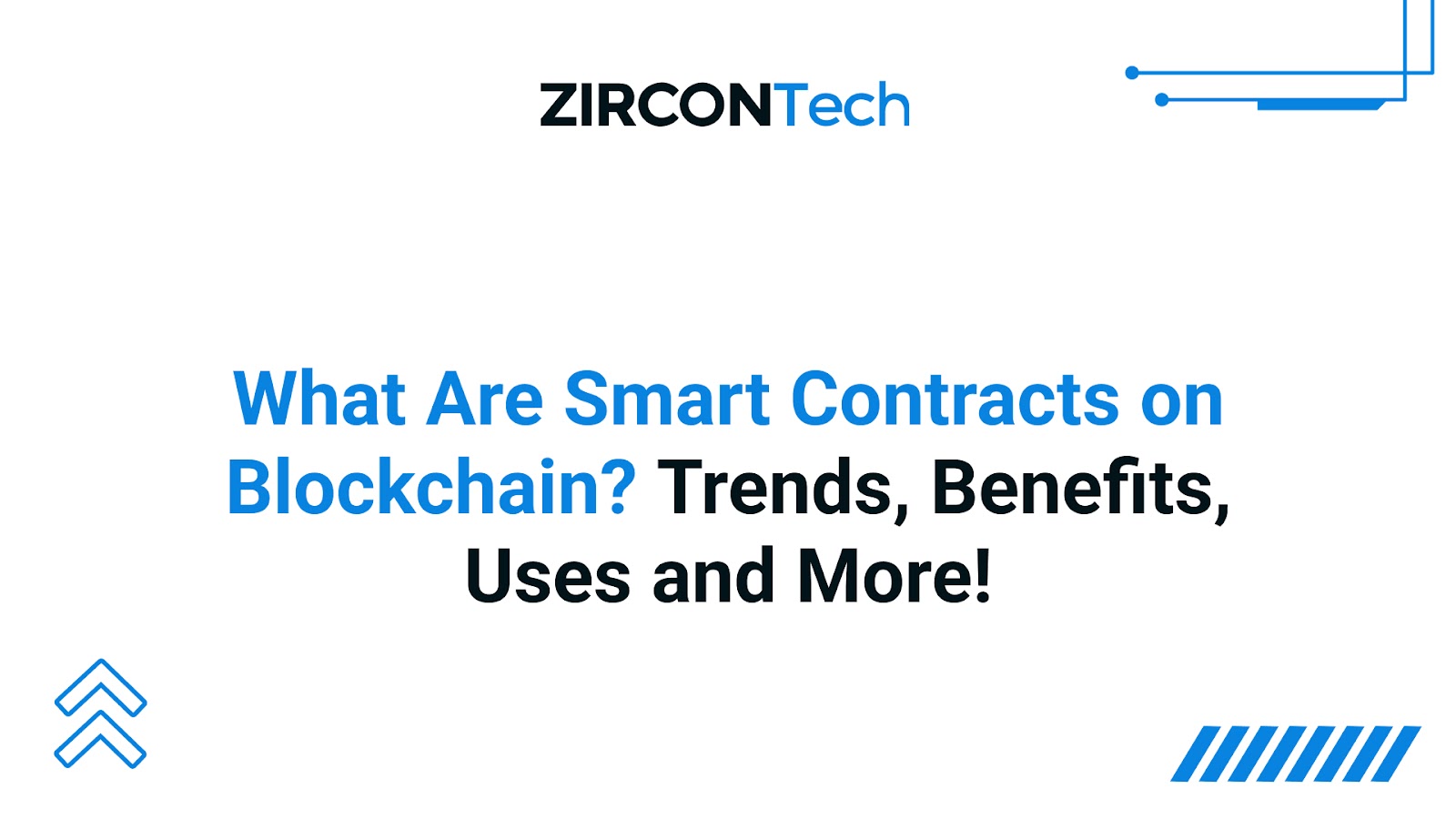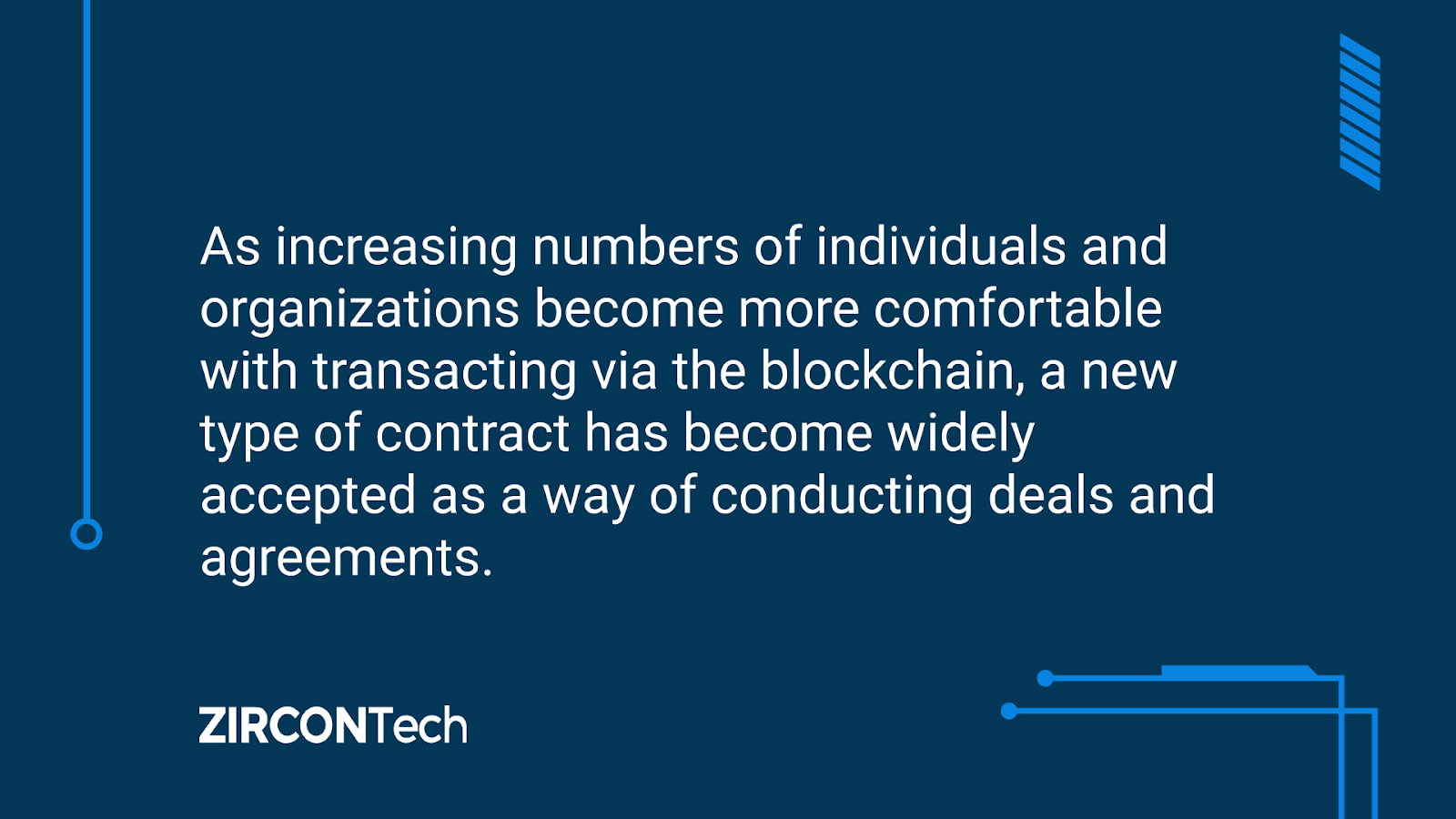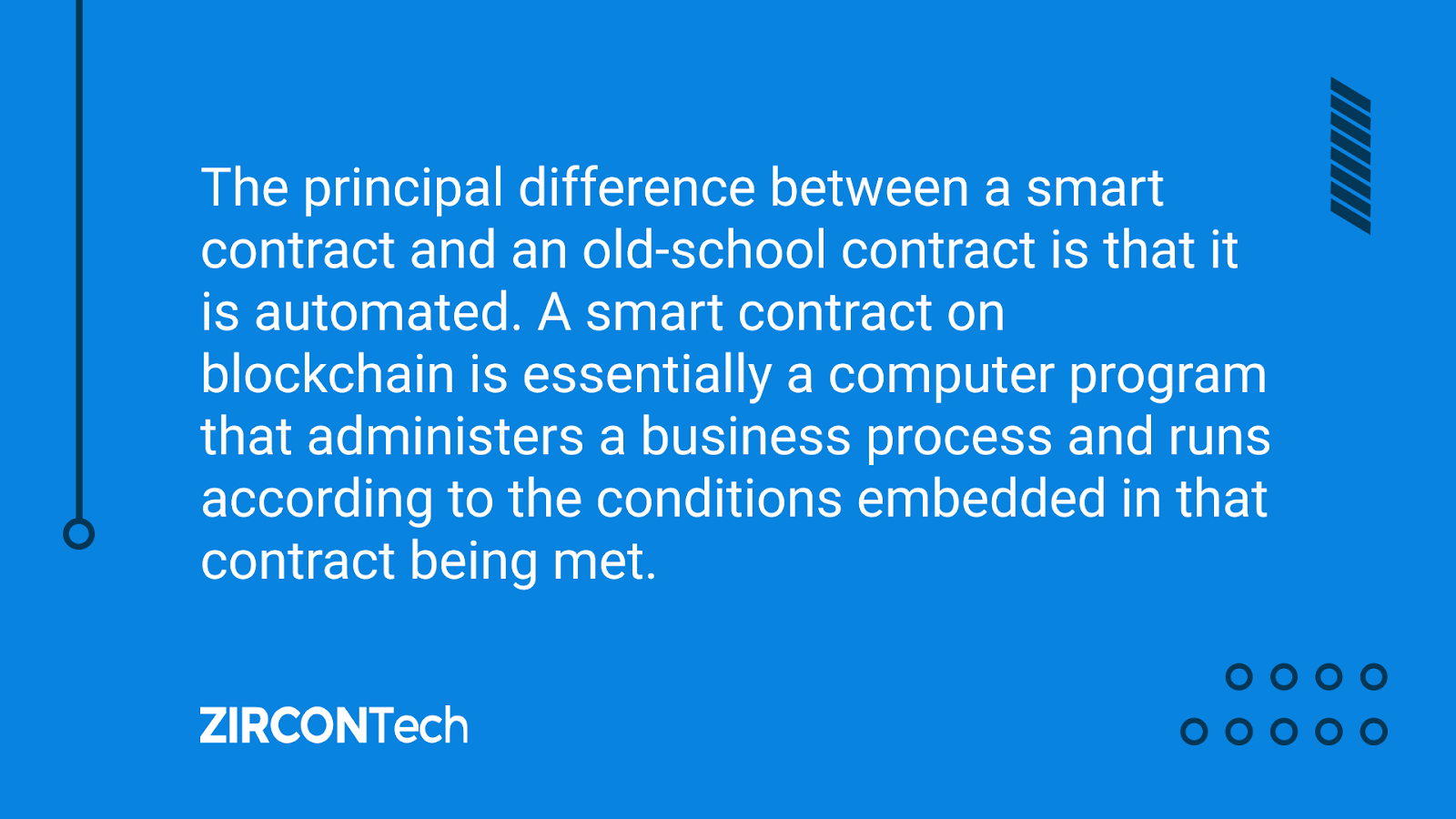What are Smart Contracts on Blockchain? Benefits, Uses and More!

What are Smart Contracts on Blockchain?
Significant volumes of transactions in the business world are administered by contracts. These are legally binding documents that record in writing the conditions under which that transaction will proceed.
Contracts exist to give peace of mind to all parties to a transaction that the matter in question will proceed as agreed verbally.

These are smart contracts, drawn up between their creator and the recipient of a service. Smart contracts are stored on a blockchain and they deliver a host of benefits to all parties.
Here we will look at the function of smart contracts on blockchain, examine several examples of smart contracts use cases, and discuss the benefits of smart contracts to all parties concerned. Our intention is to broaden your understanding of smart contracts and deliver an appreciation of how they can be used in our modern digital age.
ZirconTech is, among its many attributes, a blockchain software company. We work with organizations across the world in the creation and delivery of digital transformation solutions. As such, we have extensive expertise in the use of smart contracts on blockchain – and our knowledge brings equally extensive benefits to a host of partners who require such insight.
What is a Smart Contract in Blockchain?
A smart contract on blockchain is an agreement that acts in much the same way as a traditional contract relating to a business arrangement. There, however, is where the similarity ends.

A smart contract is, therefore, self-executing – with the conditions of the agreement between parties written into lines of code. Smart contracts on blockchain sit at the very heart of the transactions carried out digitally.
The fusion of the benefits of using a blockchain and smart contracts means that the transactions they relate to can proceed smoothly, transparently – and irreversibly.
Ethereum, the world’s second most popular blockchain, was key to the increasing popularity and adoption of smart contracts. That adoption has led to the creation of Ethereum’s wide range of decentralized applications, also known as DApps, and the use of smart contracts in an array of use cases.
How Do You Create Smart Contracts on Blockchain?
If you want to create a smart contract, you will have to pay gas – and the more complex a smart contract is, the higher the price. You might have to pay more than $5,000 on deployment for a medium-sized contract.
While other blockchains support smart contracts, Ethereum remains the most popular blockchain for this purpose. By mid-2021, there were more than 2.5million smart contracts deployed in Ethereum.
Should you wish to add to that number, you will need to follow these steps:
- Connect to the Ethereum network by installing and enabling a MetaMask wallet.
- Choose a test network so that you can trial your smart contract.
- Add Testnet ETH to your wallet so that you can fund your process.
- Use the Remix browser to write your smart contract.
- Create a .sol extension file.
- Complete your smart contract code, most likely using the programming language Solidity.
- Deploy your smart contract on your test network through your Remix browser.
- It is recommended that you test and audit your smart contract before making it live on the Ethereum mainnet.
How Smart Contracts Work in Blockchain
Nick Szabo, one of the leading pioneers of modern computer science, was one of the first advocates of smart contracts on blockchain. He defined smart contracts as a set of virtual promises, with associated protocols to enforce those promises.
What does this mean in practice? How do smart contracts work in blockchain? Their operation, once drawn up, agreed and deployed, can be summarized as follows:
i) One party to the contract makes a transaction from their blockchain wallet that triggers one of the terms in the smart contract.
ii) That transaction arrives at the database, where it is confirmed and approved.
iii) The transaction, which includes the code that defines precisely what actions are being carried out, is added as a block in the blockchain.
It is apparent that smart contracts on blockchain follow the if-then model of computer logic. To put it another way, think of a vending machine. When you insert a dollar and press a particular set of keys corresponding to the item you want, the machine goes into action.
It understands that you have inserted the correct currency, and that you have specified that you want a particular item. Once that is established, it releases the item for you. That is exactly how a smart contract works too.
What are the Benefits of Smart Contracts?
Now that we understand what smart contracts are, how they are created and how smart contracts work in blockchain, let’s look in detail at the benefits of smart contracts that can be enjoyed by the people and organizations who create and use them.

Speed and Accuracy
This is arguably the most important and valuable of all the benefits of smart contracts. One of the most common types of transaction in which traditional contracts play a key part is the sale of a piece of property. Think of how protracted that process can be as the contract is drawn up manually and then checked before being issued.
Because smart contracts are drawn up digitally, and operate automatically, there is no need for human interaction. As soon as a condition of smart contracts on blockchain is met, the resulting action is immediately implemented.
This offers the potential to cut down massively on the amount of time a legal process might take – and, because the process is carried out digitally, the risk of human error is eliminated. There is no possibility of any part of the documentation being filled out wrongly by hand.
Transparency
Encrypted transaction logs are made available to all parties to smart contracts on blockchain. This ensures that there is transparency at all stages of the process.
Because no third party can make a change to the smart contract in question for any reason, the whole process is more reliable and trustworthy.
Security
The fact that smart contracts on blockchain are encrypted makes them incredibly difficult to hack. Another factor that adds to the level of security implied in a smart contract is that every entry on a distributed ledger is linked to the preceding and following action. To change a single record, a hacker would need to alter the entire chain.
Cost-effectiveness
Again, let’s think about the example of a real estate transaction. Quite apart from the time saved by using a smart contract, the financial savings can be considerable too. Because you do not need the involvement of third parties, those expensive legal fees could be a thing of the past.
Smart Contracts Use Cases
Now we know how smart contracts work in blockchain, and what the benefits of smart contracts are, let’s look at some real-life instances where deploying a smart contract is a logical choice that can make a significant positive difference to a commercial or corporate transaction.
Records and personal identity
Many organizations and professions have to keep detailed records that need to be properly stored and maintained. Examples include confidential medical files, or sensitive legal documents that relate to important cases or situations.
On a wider front, any person’s digital identity could become tokenized. In principle, any of us could use this facility to interact on social media, to submit documents for legal purposes – and, crucially, to control the amount of information about ourselves that is available for public consumption.
Commercial transactions
This is probably the largest category of use cases where the benefits of smart contracts apply most compellingly. Any sale or purchase could technically be the subject of a smart contract. This is particularly relevant in the case of complex commercial agreements that are governed by in-depth contracts.
The if-then nature of smart contracts on blockchain ensures that as soon as a condition is met – for example, when the agreed funding has arrived to cover a purchase – the item in question can be released to the buyer.
As we have seen, that can lead to a significant saving both in terms of the finance needed to pay professional experts, and in the time taken up by the transaction.
Supply Chains
Many supply chains are intrinsically complex, and rely on the input of several devices linked by the Internet of Things. The automation of smart contracts can deliver the benefit of those devices communicating automatically, securely and reliably.
Without the involvement of third parties, or human intervention, the potential exists to cut back dramatically on errors, loss and theft.
As a result, every step in the supply chain can be processed automatically and in a trustworthy manner. The fact that goods or products could be delivered instantly when all the conditions of a smart contract are met is a strong incentive for suppliers.
Real Estate Purchases
Several elements of any transaction involving property may involve a contract. Using a smart contract instead means that the agreement relating to the purchase can be automated and, therefore, transacted smoothly. The same benefit accrues to the mortgage on that property. Numerous types of property – apartments, buildings, light industrial units – can be transacted in this manner, and the new ownership can be registered efficiently through the use of a smart contract.
Insurance Policies
This is another of the most compelling potential smart contracts use cases. Logically, an insurance policy could be written as a smart contract between an individual and their insurance provider. If the need arises to make a claim against that policy, the holder could simply upload the relevant documentation that proves their eligibility for a payout.
Yes, you would still need to process paperwork to make a claim – but the process of making that claim, and getting a positive outcome from your insurers, could be much more streamlined than it is currently.
Potential pitfalls of smart contracts on blockchain
While there are clearly some spectacular benefits to be enjoyed thanks to the relationship of the blockchain and smart contracts, it must be noted that there are some possible shortcomings too. They include:
- Compliance issues: Companies and governments may be lagging behind in their acceptance of, and familiarity with, smart contracts. As a result, some of the required legislative structure may not be in place.
- Data integrity: The automation of the processes involved in the deployment and implementation of smart contracts on blockchain may eliminate human error – but if poor data is introduced, it could affect the accuracy and efficiency of the smart contract.
- Sustainability: It has to be admitted that the public blockchain has a significant carbon footprint. In an era when sustainability is at the core of so many companies’ ESG and CSR policies, any option that decreases the negative environmental impact of smart contracts should be embraced.
Work with ZirconTech on Your Smart Contracts on Blockchain
ZirconTech is proud of its reputation as a leading provider of high-quality blockchain software development. As a result of our expertise in this field, we can offer an insightful consultancy service regarding every aspect of the blockchain – including smart contracts.
Contact us to discuss how ZirconTech can be the ideal partner in your digital transformation project.